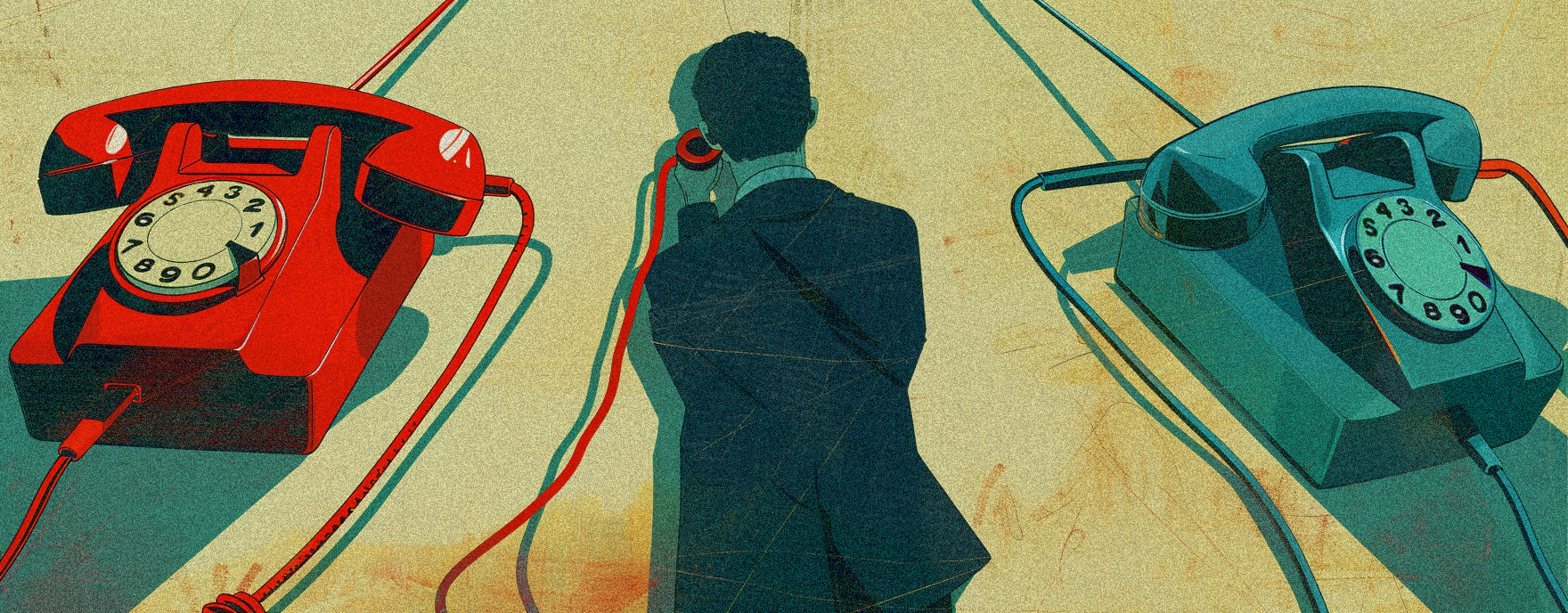12/02/2024
Telephone conversations today can easily be intercepted, recorded, and analyzed. Participants of the dialogue may not realize that every word is being captured and can be used against them. This threatens not only personal privacy but also the security of businesses. You may think that everyday conversations are worthless. However, they contain everything about you — youryour personal life, affairs, business, political preferences, and whereabouts.
This article explores the topic of mobile phone eavesdropping. Here, we will delve into the kaleidoscope of mobile surveillance — fromfrom why it can happen to the methods used. We will look at the possibilities of protecting against eavesdropping and try to find a more effective method than a foil hat.
How to Detect Phone Eavesdropping
Mobile phone eavesdropping can expose all aspects of a person's life: daily habits, food preferences, leisure spots, and social connections. It can also reveal professional information, including details of business meetings, corporate strategies, and confidential work data. This list is almost limitless and depends on how the individual uses mobile communication. These data can be used for various purposes: marketing analysis to blackmail or corporate espionage.
But you're mistaken if you think your personal secrets are of no interest to anyone. Eavesdropping can concern a wide range of people. Here are some examples:
- Politicians — risk being listened to by opponents or governments for gathering compromising material and political pressure;
- Businesspeople — can become targets of corporate espionage;
- Journalists and media — if working on sensitive topics;
- Law enforcement and lawyers — again, if working on sensitive topics or high-profile criminal cases;
- Scientists — sensitive political, social, or even fundamental research may attract the attention of foreign governments;
- Сitizens — in specific cases, can become victims of phone eavesdropping due to personal conflicts or family matters (but this usually rarely happens).
In September 2019, investigators discovered that China used hacked websites. Through an exploit in iPhones, Chinese intelligence services were able to access the locations of many Uighur Muslims. Unknowingly, anyone visiting a particular site would download malicious software onto their phone.
However, even if you have visited a site that downloaded such software onto your device, some signs can indicate someone is spying on you.
Strange Messages, Unstable Performance, and Other Signs of Eavesdropping
There is a multitude of powerful hacking software that allows tracking a person's calls. We will talk about some types of such software later. Let's try to understand the signs indicating your phone is being tapped. There are specific "symptoms" mentioned when discussing phone eavesdropping. Typically, five of them are highlighted.
- Unusual sounds during calls: background noise, clicks, and echoes during conversations.
- Increased battery consumption: the phone discharges quickly. Spyware on the device can often run in the background and drain the battery.
- Unstable device performance: if your phone frequently freezes, reboots, or responds slowly. Spyware can overload the system.
- Excessive data usage: if the internet data is quickly used up. Spyware transmits data (again, constantly in the background). This can include audio recordings, photographs, or other information.
- Strange messages: text messages with unintelligible symbols could be part of spyware's installation or management process. These messages could be commands for activating or configuring such software.
- Physical signs on the device: relatively rare, but if someone else has had access to your phone. You see scratches or signs of the cover being opened afterward—it's possible someone opened the phone without your knowledge.
It's important to understand that even if you observe several of these signs, it's not a 100% guarantee that you are being eavesdropped on. Sometimes, such issues can occur due to the network operator's problems or issues with your phone.
Eavesdropping can take various forms and use different technologies, from acoustic bugs to complex spyware. The goal of the process is to gather some confidential information about a person. Considering such a wide range of tasks and means, detecting eavesdropping is also more complex.
Moreover, technologies are constantly changing. New, more complex espionage methods are emerging, which are difficult to detect. Modern spy programs can be installed on a smartphone or computer covertly. However, methods to detect spyware still exist. We will consider some of them next.
Anything You Say Can and Will Be Used Against You: Methods and Means
There are several methods for eavesdropping on phone conversations.
The first method is passive. It is one of the most complex and requires expensive and specialized equipment. Despite the high cost, which can reach hundreds of thousands of euros, such systems are still available on the grey markets in Europe.
The second method is based on interference with mobile communication authentication protocols. It requires less complex equipment, such as modified phones and computers, and its cost is usually lower – ranging from tens to hundreds of thousands of dollars. This setup allows intercepting signals between subscribers, acting as a mediator in data transmission.
The most straightforward and most accessible third method is malicious software. Developing such programs costs "pennies" compared to other methods. It could be a file sent to the user or malware disguised as a regular app. One way is to use existing messenger apps, which can be compromised and used for unauthorized access to a user's conversations and messages. This can be implemented through software vulnerabilities or malicious updates that covertly install spyware.
Of course, these methods are constantly changing and improving. Either way if you're using your phone, you should know these things. Check your phone and avoid using dangerous applications (messengers with weak encryption).
Let's consider which apps should not be used for private messaging. Talking about specific apps is difficult because technologies, code, encryption – all of this can change. However, there are several principles by which you can understand that an app is not private.
- Lack of end-to-end encryption.
- Weak privacy policy.
- Located in countries with weak data protection laws.
- Absence of regular updates.
It would be wise to be cautious about using Russian products or services, even those that have some ties to Russia. For example, when it comes to the Russian social network VK, it's a good idea to operate under the assumption that anything you post could potentially be accessed by Russian intelligence. This caution extends to mobile operators based in Russia as well. In essence, it's about safeguarding your privacy and ensuring your digital communications remain secure.
Real-Life Cases: From Target's Advertising Coupons to Journalist Blackmail
In 2002 Minneapolis, USA, there was a scandal involving coupons. One day, an angry man entered a local Target store with coupons from the store in his hands. He demanded explanations as to why his daughter, who had just finished high school, received discounts on pregnancy-related products.
At first everyone assumed it was a mistake. Later, when the manager called the man back, this man apologized to the store employee. It turned out that his daughter was indeed pregnant.
This story was discussed in the news, revealing that Target was using an advanced mathematical model. This model predicted which women were pregnant based on their shopping habits. It calculated and automatically sent out such coupons. However, the fact that it involved an intrusion into personal life, albeit quite exotic, raised concerns.
In the previous case, a computerized mathematical model was the tool for gathering information. In the following case, it involved human calculation.
At the beginning of the year, a video appeared online showing employees of the journalistic project Bihus.Info allegedly using drugs during a New Year's corporate party. This video was posted by a dubious website. However, immediately after its appearance, the management of Bihus.Info announced personnel changes and drug testing for all employees. The founder of the project, Denys Bihus, declared illegal eavesdropping and video recording of employees. The Security Service of Ukraine is investigating this incident, and the head of the Verkhovna Rada Committee on Freedom of Speech expressed concern about the pressure on the media. It turns out that anyone could potentially surveil, for example, investigative journalists, blackmail them, and intimidate them?
Why Don't People Use Secure Messengers More?
Typically, apps considered more secure are developed by a limited number of people. These teams also lack the resources needed to "promote" their project. For example, Signal was designed in such a manner. This leads to a paradox — it's much easier to create and market an app that will extract personal data from users and sell it. Of course, this doesn't mean that everyone does this.
Let's consider a list of the most popular applications. Here are the 8 most popular in the E.U.E.U. and the world.
In Ukraine, according to the Kyiv International Institute of Sociology (KIIS), the most popular messenger is Viber, which is used by approximately 73.6% of respondents. In second place is Facebook Messenger, at 42.7%. Telegram (used by 31.6% of respondents) and WhatsApp (25.3%) are in third and fourth places, respectively. At the bottom of the list is Signal, traditionally considered one of the safest. It is used by only 3.8%.
Among all these, identifying the truly secure ones is relatively easy. Let's apply three simple criteria:
- End-to-end Encryption (E2EE): A secure messenger should use end-to-end encryption for all messages.
- Data Deletion: The ability to delete all your data and messages.
- Does Not Store User Information on Servers.
Applying these criteria leaves only one app — Signal. Threema, which specifically meets these requirements, is not listed among the most popular in Ukraine. WhatsApp and Telegram partially meet these requirements. All others do not fulfill any of the three criteria. Therefore, your conversations, messages, and calls could be intercepted in those apps.
Update: Regarding Rakuten Viber
Following the publication of this article, representatives from Rakuten Viber's external press office reached out to the editorial team. They emphasized that the Viber app provides end-to-end encryption for all types of communication between users by default. According to Rakuten Viber representatives, access to correspondence is possible only from the devices of the dialogue participants.
The company also noted that Rakuten Viber responds to user requests for viewing and deleting their data, providing an additional level of control over personal information. Each user can request to review and delete their data from the server. Detailed information on how to do this is specified on the application's official website.
In its review of secure messengers, the Molfar editorial team considered various aspects: end-to-end encryption, data deletion capabilities, and the storage of user information. The choice of criteria for analysis was based on the subjective opinion of the editorial team and may be supplemented.
Protecting Your Conversations: Choosing a Reliable Antivirus
If you suspect you are being monitored, deleting all your messengers is not necessary. Of course, caution is essential — delete spam and phishing messages. Do not open dubious apps. The first thing worth doing is finding a reliable, paid antivirus or a program that detects explicit spyware.
Avast Antivirus & Security is a cross-platform antivirus from Avast. It offers antivirus protection, device lock, Wi-Fi security, cleaning of unnecessary files, and more. The app's developers are based in the Czech Republic. After the start of the full-scale invasion, they announced the cessation of operations in Russia and Belarus. Ukrainians are offered a free extension of the license.
Norton 360 is an antivirus that can also help eliminate spyware on your phone. The company is known for actively monitoring the dark web to quickly identify threats. It helps protect your webcam and conducts regular privacy monitoring.
iVerify is designed for iOS. It helps track vulnerabilities, manage account security, block dangerous pages in Safari, and identify iPhone vulnerabilities. This app was created by Trail of Bits, a security firm that conducts research in security.
Bitdefender is a program developed by a company in Romania. It features a cloud scanner to detect and remove spyware and malicious software effectively. It includes a firewall, phishing protection, a secure browser, and a VPN. In 2012, the company was doing business with SafeLine from Russia. This collaboration aimed to raise Bitdefender's popularity in Russia and increase sales. However, in 2022, Bitdefender joined the sanctions and ceased cooperation with Russia, according to their official statement.
Searching for a reliable antivirus should be considered like hiring a personal bodyguard for your device—be it a computer or a phone. Keep in mind that the programs we've mentioned here are just examples. There are many of them, and not all can be trusted. This is especially true for Russian software.
To reduce the risk of phone eavesdropping, choose an antivirus with high protection. It must have a good reputation, positive reviews, and regular updates.
Ease of use is also significant. An antivirus should be inconspicuous, non-intrusive, and free of excessive advertising. It should work in the background — that is, meet the requirements of your "hardware." Do not install super-advanced antiviruses on a weak device.
Of course, cost is essential, too. Ideally, an antivirus should be paid, but currently, most antivirus companies offer free versions. They have less functionality but can still help protect your phone.
There's also an opinion that antivirus apps for phones don't help. Indeed, the first line of defense can be Google Play. It features Play Protect, which acts as the primary antivirus for your phone. If you're installing APK files, it's advisable to first check them through VirusTotal. This serves as a second antivirus option. You can also look for a list of antiviruses on forums dedicated to mobile device security.
Are Your Phone Calls Being Monitored by Artificial Intelligence?
Artificial Intelligence is becoming an increasingly important tool for intelligence agencies, but it has challenges. Among the main advantages of AI is its ability to process large volumes of data, which is crucial for intelligence work. However, while data processing quality can be high, the ethics and confidentiality of using artificial intelligence, for example, in eavesdropping, remain open questions.
AI is already being implemented in various work directions. This includes using AI for analyzing social networks, chats, messages, and recorded mobile conversations. This is believed to help process data faster and detect, for example, terrorist threats. AI can find "keywords" in different sources. Regarding the eavesdropping of phone conversations precisely, AI can convert voice to text, extract particular topics or words, and identify dangerous elements if it considers them as such.
For those who cherish privacy, the picture seems bleak. Artificial intelligence could become an all-seeing eye, monitoring every step and knowing more about you than you wish.
Challenges of Digital Hygiene
As we see, phone eavesdropping is a severe threat. Modern technologies allow not only special services but also malefactors to utilize eavesdropping. Of course, significant funds are needed for this. Still, a terrorist state like Russia, known for its aggressive tactics, could easily exploit this.
One of the popular methods of eavesdropping today is through software. It's cheaper and easier to use. That's why paying attention to the apps you install on your smartphone is essential. Do not grant them access to your personal data and permissions that could be used against you.
For intelligence services, eavesdropping is an indispensable tool for finding criminals and terrorists. However, there are also several legal issues associated with such practices. There are risks that innocent people could become victims of mistakes and miscalculations. The use of artificial intelligence in eavesdropping presents an even more complex issue.
To conclude, here are several tips that can help protect your privacy:
- Use antiviruses, even free ones, to protect against malicious programs.
- Enable two-factor authentication where possible.
- Check your phone's privacy settings.
- Familiarize yourself with the privacy policy of the apps you use.
Today, in the era of smartphones, phone eavesdropping can become a problem for anyone.




